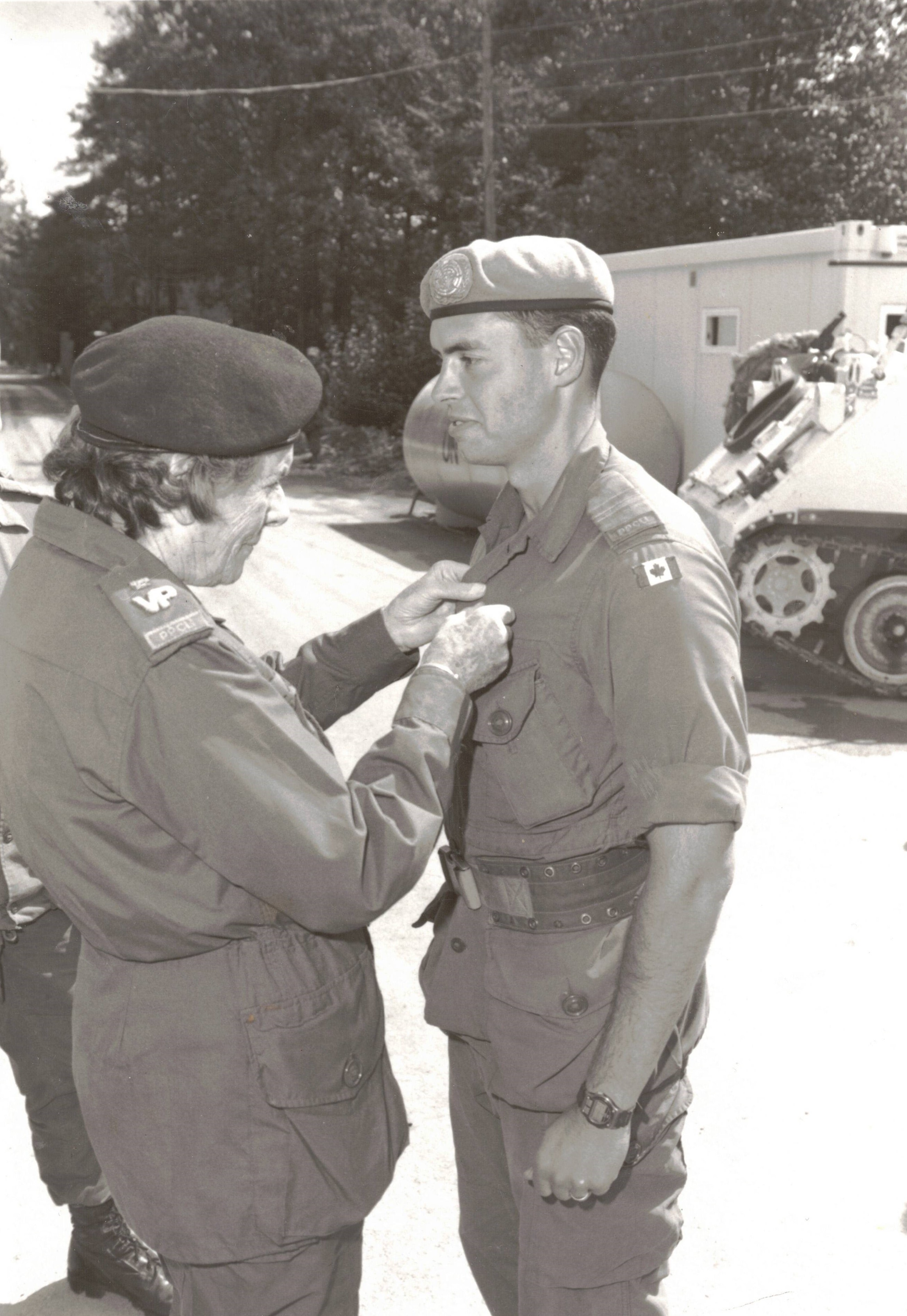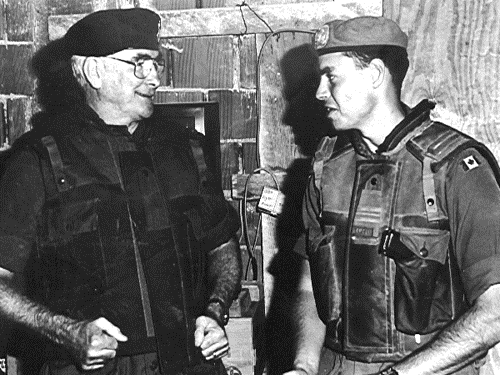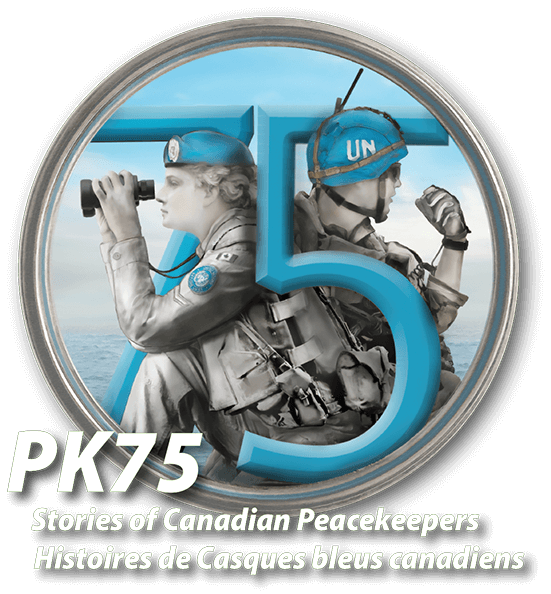

The United Nations Protection Force (UNPROFOR) was established in February 1992, ostensibly to provide immediate security for the settlement of the Yugoslavian crisis. I recall being very excited to deploy with 3 PPCLI as this was my first UN mission. I returned to 2 PPCLI in Winnipeg in January to assume command of a newly formed, reserve-heavy, rifle company (Coy). We underwent a whirlwind three months of intensive pre-deployment training which included three weeks of predominantly live fire training in California. I then deployed back to Croatia in late March of 1993 as an Acting Major in command of C Coy.
In early August, much to everyone’s surprise, C and D Coys were deployed to Sector South (Krajina) which later led to the decision that the entirety of the Canadian Battalion would relieve a French Battalion in Sector South. Little did we know that soon, on 9 September the Croat forces would launch a major operation into the Medak Pocket. The Croat advance was eventually blunted at the outskirts of Medak by the Krajina Serb forces. On 14 September, the Canadian Battalion was given orders to implement a cease-fire agreement in the Medak Pocket and was allocated two additional French companies. C Coy was tasked to interpose itself between the combatants, and to open the Highway to Gospić, thereby permitting the remainder of the unit to push the Croats back to the previous line. Upon completion of that task, the unit was to collectively create a buffer zone and conduct a sweep to document suspected Croat ethnic cleansing.
Early in the morning of 15 September, following very abbreviated battle procedure and reconnaissance, C Company deployed to three platoon locations between the Croat and the Serb frontlines. Our rapid deployment evidently caught the Croats by surprise, and we were greeted with weapons fire. After digging in, C Company weathered multiple Croat attacks and indirect fire for fifteen hours. Seven Platoon narrowly avoided an Anti-tank minefield as it secured the near Serb side of the highway. C Company’s next task was to cross no man’s land to open the highway. The highway itself was rendered impassable due to a belt of anti-tank mines. My Commanding Officer (CO) had prudently reconstituted the Anti-Armour platoon and grouped a Section of TOW anti-tank guided missiles under my command, which provided us much needed overwatch. After giving it some thought, I decided that my M113 armoured personnel carrier would lead across no man’s land. My guidance to the crew was clear — we would approach the Croats at a slow and steady pace. I ensured that our heavy machine gun would be trained over the Croats in a ready, but less threatening, manner.
We set off precisely at 1200 hours. During our advance, we watched the Croats remove the tarps from their SAGGER anti-tank missile systems and ready their weapons. Stopping short of the anti-tank mines, I dismounted and initiated discussions with the senior officer present who refused passage.
Events took a surprising but fleeting turn as the Croats picked up their mines and started to clear the highway. The order to carry out this activity was almost immediately countermanded with the arrival of a Croat General. My CO arrived and attempted to negotiate passage. Having no success, he convened a hasty press conference which compelled the Croat General to direct the removal of the mines, thereby permitting D Coy to cross into the Croat-dominated side of the pocket, followed by the French companies. In the end, the battalion successfully expelled the Croats from the pocket and established a buffer zone. It was abundantly evident that the Croats had conducted an ethnic cleansing and scorched earth operation which was documented in the UN special assessment that eventually led to the ICC indictment of a Croat General.
Sadly, the unit returned to Canada with little fanfare and the hundreds of reserve soldiers who had answered the call returned home. Nearly a decade later, 2 PPCLI was awarded one of the first two Commander-in-Chief unit commendations for its distinguished conduct in Medak. Today, the operation has become synonymous with the reality that contemporary peacekeeping operations have become much more complex and dangerous. It is also remembered for its incredible display of the steadfastness of our soldiers, both Regular and Reserve, while under fire. Separating Croat and Serb forces in contact, without loss of life, is a feat worthy of admiration. That said, far too many suffered invisible wounds from the exposure to danger, stress, and the inhumanity of ethnic cleansing.
Biography
Hailing from Pinawa, MB, I commenced my military career as a soldier with the Royal Winnipeg Rifles in 1978. In 1979, I transferred to the Regular Force and attended both Royal Roads and Royal Military College, graduating with a Bachelors Degree in Political and Economic Science in 1983. I was fortunate to continue my studies at Queen’s University on scholarship receiving a Masters in Political Studies in 1984.
I was commissioned into the Princess Patricia’s Canadian Light Infantry (PPCLI) and commenced regimental duty with the First Battalion in Calgary. From 1984 to 1987, I served as a rifle platoon commander, Assistant Adjutant, and as Second-in-Command of a rifle company. Following that, I was posted to Belleville, ON where I served three years as the Adjutant of the Hastings and Prince Edward Regiment.
In 1990, I was posted to 2 PPCLI in Winnipeg as a Captain, where I served as Second-in-Command of Administration Company and as the Battalion Adjutant. I also had the pleasure of commanding Combat Support Company, C Company, and Administration Company. During this posting, I deployed twice to Croatia as part of UNPROFOR. I volunteered to be attached to 3 PPCLI in 1992 and served as the Senior Liaison Officer for the Canadian Battalion. After three months back in Canada, I returned to Croatia in 1993 as Officer Commanding C Company. The highlight of this tour was the Medak operation for which 2 PPCLI was awarded the Governor-General’s unit commendation.
In 1994, I was posted to Toronto where I served two years as G3 (Operations Officer) of 32 Canadian Brigade Group. Remaining in Toronto, I attended the Canadian Forces Command and Staff College, graduating in 1997. Upon graduation, I was posted to Land Force Atlantic Area Headquarters in Halifax where I served as G3 Operations until promotion to Lieutenant-Colonel in 1999. Following promotion, I served as G3, G5, and Chief of Staff of the Headquarters while concurrently commanding the 5th Canadian Ranger Patrol Group which is based in Newfoundland and Labrador. I had the privilege of coordinating several domestic operations and I received a Deputy Chief of Defence Commendation for Operation PARASOL which involved the support to Kosovar refugees in response to an appeal from the United Nations High Commission for Refugees (UNHCR).
In 2002, I assumed command of Western Area Training Centre in Wainwright which also included Base Commander responsibilities. During my tenure, I oversaw significant growth and organizational change resulting in the doubling of military personnel and the separation of the School from the Base on my departure in 2005. From 2005 to 2008, I served as the Assistant Director of Army Training within the Land Force Doctrine and Training System Headquarters in Kingston, ON.
In 2008, I deployed to the Democratic Republic of the Congo for a one-year UN tour as an Acting Colonel. I commanded the Canadian Task Force while simultaneously serving in the Force Headquarters as the Deputy Chief of Staff Operations and Plans of the United Nations Mission in the Democratic Republic of Congo (MONUC). In this capacity, I directed operations during a period marked by considerable crisis and instability. I was fortunate to be awarded a Force Commander’s Commendation for my efforts.
On return to Kingston in 2009, I was posted to the Canadian Army Staff College as an instructor and for two years was the Deputy Commandant. I was deployed again as an Acting Colonel to Kabul, Afghanistan where I served as the Senior Advisor to the Vice Chief of the Afghan National Army as part of the North Atlantic Treaty Organization (NATO) Training Mission.
After 35 years in uniform, I retired from the Canadian Forces in 2013 and accepted a position as the Executive Director of the Royal Military Colleges Club of Canada which was the Alumni Association for Canada’s military colleges. Departing there in 2017, I continue to work part-time as a Calian contractor supporting the design and delivery of Army exercises. I am married to an incredibly wonderful and supportive wife Jennifer, and we are proud parents of Laura, Karyn, and Steven, and grandparents to William and Graham. I am passionate about golf, curling, and hockey and together with Jennifer we enjoy travel and spending time at the cottage.

Lady Patricia presents the UNPROFOR medal to Bryan, September 1993, Sveti Rok.

Major-General Herb Pitts, Colonel of the Regiment, PPCLI, with Bryan Bailey, OC C Company, Medak House, Sector South.


